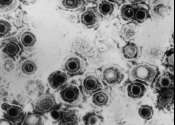Getting kids ready for the new school year
(HealthDay)—There are a number of things you can do to ensure your kids have a smooth start to the new school year.
Aug 20, 2018
0
0
(HealthDay)—There are a number of things you can do to ensure your kids have a smooth start to the new school year.
Aug 20, 2018
0
0

Long periods of waking can lead to cognitive impairment, and the need to sleep continues to build up. Sleep then refreshes the brain through alterations in molecular biochemistry. These changes impact neuronal plasticity ...
Jun 13, 2018
0
161

Millions of individuals obtain insufficient sleep on a daily basis, which can lead to impaired performance and other adverse physiological outcomes. To what extent these impairments are caused by the short sleep duration ...
May 21, 2018
0
583

New research published in The Journal of Physiology shows that our brain clock can be shifted by light exposure, potentially to align it with night shift patterns. It highlights that a 'one size fits all' approach to managing ...
Mar 28, 2018
0
6
Once herpes simplex infects a person, the virus goes into hiding inside nerve cells, hibernating there for life, periodically waking up from its sleep to reignite infection, causing cold sores or genital lesions to recur.
Mar 15, 2018
0
81

You may have experienced sleepless nights when you were anxious, stressed or too excited. Such emotions are well-known to affect wakefulness and can even cause insomnia, though the underlying mechanisms in our brain have ...
Jul 3, 2017
0
15

Scientists at the Research Institute of Molecular Pathology (IMP) in Vienna study fundamental aspects of sleep in roundworms. Using advanced technologies, they monitor the activity of all nerve cells in the brain while they ...
Jun 23, 2017
0
128

Narcolepsy, a serious sleep disorder in which patients often fall asleep uncontrollably, has been incurable because no effective therapeutic agents are available to date. Recent findings by Japanese scientists in the sleep ...
May 30, 2017
0
4

Athletes often have to compete late in the evening, when they are no longer able to perform at their best. As reported in the journal Frontiers in Physiology, however, researchers from the University of Basel have shown that ...
May 19, 2017
0
37

For people with severe brain injuries, researchers have found that the rhythm of daily fluctuations in body temperature is related to their level of consciousness, according to a preliminary study published in the April 19, ...
Apr 19, 2017
0
3